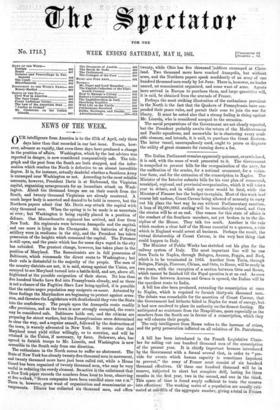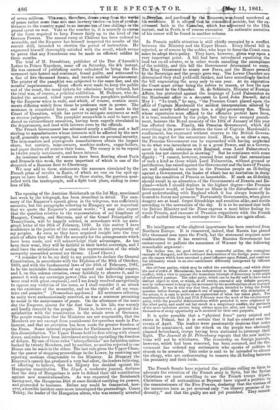A bill has been introduced in the French Legislative Cham-
ber for calling out one hundred thousand men of the conscription, of the present year. It is chiefly important because introduced by the Government with a formal avowal that, in order to "pro- vide for events which human sagacity is sometimes impotent to prevent," the army of France must consist of six hundred thousand effectives. Of these one hundred thousand will be in reserve, subjected to short but complete drill, lasting for three months in the first year, two in the second, and one in the third. This space of time is found amply sufficient to train the reserve into effectives! The working males of a population are usually esti- mated at oietfifth of the aggregate number, giving a total in France
of seven millions. Thiemany, therefore, dram away from the Instil of peace rather more than one man in every twelve—a loss of produce tiveness to the conntry equal to an income-tax_of two shillings in the pound spent on war. 'Vast as the number is, it is scarcely' in excess of the force required to keep France fairly up to the level of the German Powers. The annual camp at Chalons has been ordered to assemble, and the Emperor has himself inspected the results of the recruit drill, intended to shorten the period of instruction. He expressed himself thoroughly satisfied with the result, which seems to prove that any Frenchman can be made an efficient soldier in three months.
The trial of M. Dumdrinez, publisher of the Dec d'Aumale's Letter to Prince Napoleon, came off on Saturday, the 4th instant. He was accused of publishing matter calculated to bring the Go- vernment into hatred and contempt, found guilty, and sentenced to a fine of five thousand francs, and twelve months' imprisonment. The printer of the pamphlet was subjected to the same fine, and six months' imprisonment. Great efforts were made to keep the public out of the court, the usual tickets for admission being refused, but the trial was, of course, a political exhibition. M. Dufaure, who de- fended the accused, relied upon extracts from pamphlets published by the Emperor when in exile, and which, of course, contain senti- ments differing widely from those he professes now in power. The sentence is considered heavy, and an appeal will be made to the Court of Cessation, which has power to miti.gate sentences as well as reverse judgments. The pamphlet meanwhile is said to have pro- duced an extraordinary sensation, having been eagerly circulated in the departments, and read with interest even by the officials. The French Government has advanced nearly a million and a half sterling to manufacturers whose interests will be affected by the new tariff, generally upon mortgages, but sometimes on personal security. The iron-masters and piece-goods manufacturers obtain the largest share, but carriers, mine-owners, machine-makers, sugar-boilers,. and paper dealers all receive their loans. The money is to be repaid in twelve yearly instalments, and bears interest.
An immense number of rumours have been floating about Paris and Brussels this week, the more important of which is one of the desp_atch of a Russian fleet to Cherbourg.
We may add to these statements the rumours circulated by the French press of revolts in Zante, of which no one on the spot ap- pears to have heard. According to these stories, the garrison quar- relled with the tradespeople, and a fight took place, ending in some loss of life.































